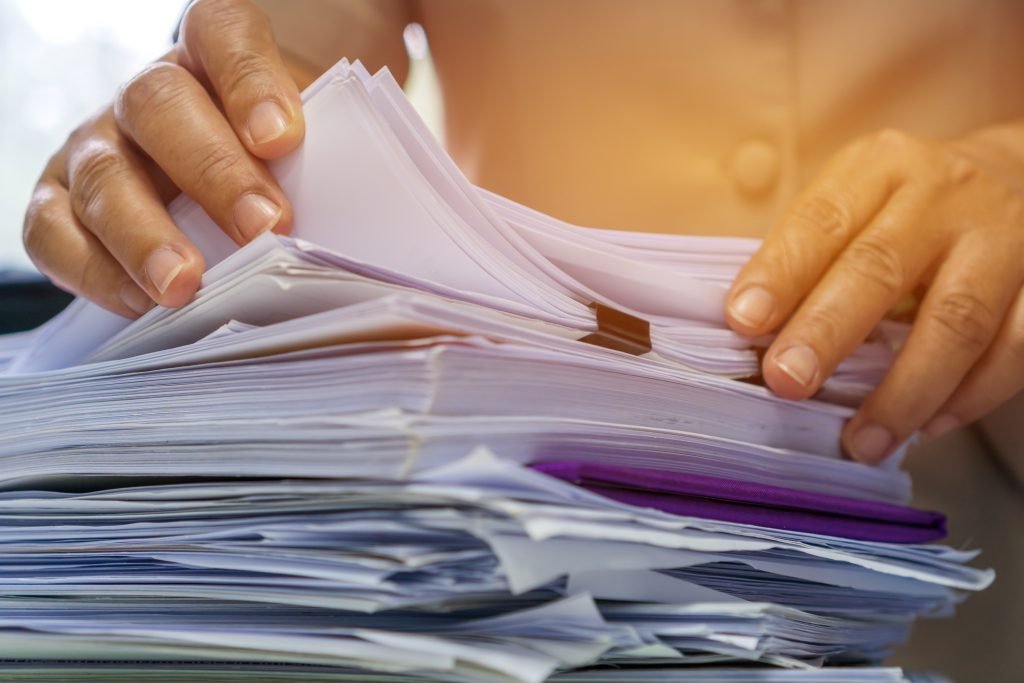 When it comes to records, how long should you keep everything? It depends on the receipts or records. Most of us have a place where we keep those “important papers” or just old bills. They can pile up quick, and it is important to know when you can say goodbye to those stacks of papers. Some records need to be kept for a month, a year, or even the duration of your life. Below is a guideline you may want to use when it comes to deciding what to keep and what to shred.
When it comes to records, how long should you keep everything? It depends on the receipts or records. Most of us have a place where we keep those “important papers” or just old bills. They can pile up quick, and it is important to know when you can say goodbye to those stacks of papers. Some records need to be kept for a month, a year, or even the duration of your life. Below is a guideline you may want to use when it comes to deciding what to keep and what to shred.
Remember it is very important to make sure that anytime you dispose of records that contain personal information (i.e., full name, date of birth, social security, or account numbers) that you shred and properly dispose of those documents.
Sales Receipts – Unless you need them for tax purposes (then keep for at least 3 years), you only need to keep the sales receipts until the warranty expires or you can no longer return or exchange the item.
ATM Printouts – You can toss these after you balance your checkbook at the end of the month.
What to keep for 1 year:
- Paycheck Stubs (You can get rid of these once you have compared them to your W2 & annual social security statement)
- Utility Bills (You can throw out after one year, unless you’re using these as a deduction like a home office –then you need to keep them for 3 years after you’ve filed that tax return)
- Cancelled Checks (Unless needed for tax purposes and then you need to keep for at least 3 years)
- Credit Card Receipts (Unless needed for tax purposes and then you need to keep for at least 3 years)
- Bank Statements (Unless needed for tax purposes and then you need to keep for at least 3 years)
- Quarterly Investment Statements (Hold on to until you get your annual statement)
What to keep for 3 years:
- Income Tax Returns (Please keep in mind that you can be audited by the IRS for no reason up to three years after you filed a tax return. If you omit 25% of your gross income that goes up to 6 years and if you don’t file a tax return at all, there is no statute of limitations.)
- Medical Bills and Cancelled Insurance Policies
- Records of Selling a House (Documentation for Capital Gains Tax)
- Records of Selling a Stock (Documentation for Capital Gains Tax)
- Receipts, Cancelled Checks and other Documents that Support Income or a Deduction on your Tax Return (Keep 3 years from the date the return was filed or 2 years from the date the tax was paid — whichever is later)
- Annual Investment Statement (Hold onto 3 years after you sell your investment.)
Records of Satisfied Loans should be kept for 7 years.
These documents should be kept while they are active:
- Contracts
- Insurance Documents
- Stock Certificates
- Property Records
- Stock Records
- Records of Pensions and Retirement Plans
- Property Tax Records
- Disputed Bills (Keep the bill until the dispute is resolved)
- Home Improvement Records (Hold for at least 3 years after the due date for the tax return that includes the income or loss on the asset when it’s sold)
Keep Forever – The following documents should be kept in a safe and secure location, like a bank safety deposit box or fireproof safe in your home.
- Marriage Licenses
- Birth Certificates
- Wills
- Adoption Papers
- Death Certificates
- Records of Paid Mortgages
Sources:
